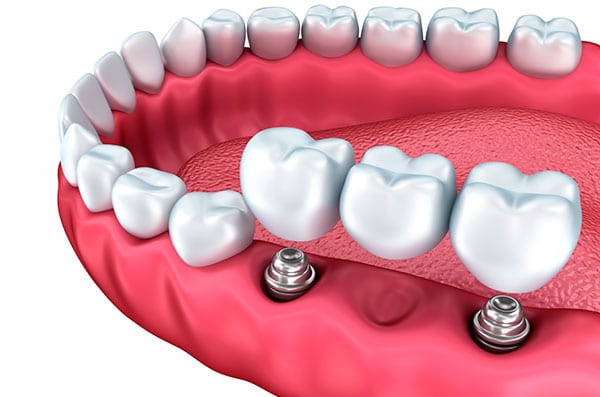 Losing even just one tooth can have a significant impact on a person’s health, confidence and well-being. This can affect a person’s ability to chew, and force them to avoid foods they would otherwise enjoy. Tooth loss can also result in shifting of nearby teeth that could cause imbalances in a person’s bite in later years, and can also affect facial appearance. Missing teeth can be replaced by dental implants: they are an alternative to dentures and bridges and are not only durable but also have the feel, look and function of natural teeth.
Losing even just one tooth can have a significant impact on a person’s health, confidence and well-being. This can affect a person’s ability to chew, and force them to avoid foods they would otherwise enjoy. Tooth loss can also result in shifting of nearby teeth that could cause imbalances in a person’s bite in later years, and can also affect facial appearance. Missing teeth can be replaced by dental implants: they are an alternative to dentures and bridges and are not only durable but also have the feel, look and function of natural teeth.
Titanium posts (called dental implants) can be surgically placed in the jawbone that replace the natural roots of the missing teeth. These implants can have porcelain teeth built on top of them, restoring the chewing function and aesthetic appearance of natural teeth. The teeth are anchored to the implants though an intermediate structure called an abutment: this structure provides the linkage to the implant, and is held to the implant via a separate abutment screw. The dental crown itself can be held in place either though linking to the same abutment screw, or through a cement bond, depending on the particular situation. The advantages of dental implants are that they do not need additional support from other teeth in order to be placed. In the majority of cases, several months of healing time are required for the implant to integrate with the jaw bone: once the dentist can verify that the implant is stable, a tooth can then be built over the implant.
Dental implants are an ideal option for people of all ages in good general oral health who have lost a tooth or teeth due to an accident, decay or injury. One of the true advantages of dental implants is that placing and restoring a dental implant does not require any modification of the existing teeth. Dental implants are permanent tooth replacements that become part of the mouth, and improve quality of life without having to take away any tooth structure from surrounding teeth to allow them to be placed in the mouth. People with particular medical conditions, significant smoking or alcohol drinking habits may need additional evaluation prior to starting with dental implant therapy.
In some cases, there is not enough bone in the jaws to successfully place a dental implant. In situations such as these, a separate procedure is needed to increase the amount of bone that is available to hold and maintain a dental implant. In some cases, this bone augmentation can be performed by a general dentist; in others, a referral to a specialist is required. After bone augmentation, it is commonly necessary to wait several months (four months or more) before placing dental implants in the area where bone material was added.
There are a wide range of options involving implants that are available to improve someone’s smile, ability to chew and to enjoy life. If you are interested in finding out if dental implants could be an option for you, book a consultation at Albion Dental Office by calling (416) 749-9732, and Dr. Trotti will be happy to discuss it with you.

